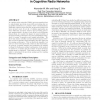Free Online Productivity Tools
i2Speak
i2Symbol
i2OCR
iTex2Img
iWeb2Print
iWeb2Shot
i2Type
iPdf2Split
iPdf2Merge
i2Bopomofo
i2Arabic
i2Style
i2Image
i2PDF
iLatex2Rtf
Sci2ools
MOBICOM
2009
ACM
2009
ACM
Impact of mobility on spectrum sensing in cognitive radio networks
In cognitive radio networks (CRNs), spectrum sensing is key to opportunistic spectrum access while preventing any unacceptable interference to primary users’ communications. Although cognitive radios function as spectrum sensors and move around, most, if not all, of existing approaches assume stationary spectrum sensors, thus providing inaccurate sensing results. As part of our effort to solve/alleviate this problem, we consider the impact of sensor mobility on spectrum sensing performance in a joint optimization framework for sensor cooperation and sensing scheduling. We show that sensor mobility increases spatio-temporal diversity in received primary signal strengths, and thus, improves the sensing performance. This is intuitively plausible, but have not been tested previously. Based on this observation, we propose a sensing strategy that minimizes the sensing overhead by finding an optimal combination of the number of sensors to cooperate and the number of times spectrum sensin...
Related Content
| Added | 28 May 2010 |
| Updated | 28 May 2010 |
| Type | Conference |
| Year | 2009 |
| Where | MOBICOM |
| Authors | Alexander W. Min, Kang G. Shin |
Comments (0)

